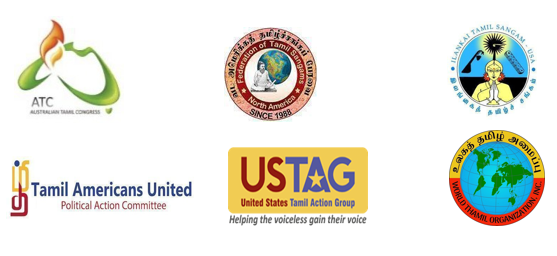Six global organisations representing the Tamil diaspora have called for broader representation of their community pertaining to initiatives that foster dialogue and collaboration for a harmonious and inclusive Sri Lanka.
This was in response to recent discussions the Global Tamil Forum (GTF) and a group of esteemed Buddhist monks had with President Ranil Wickremesinghe.
During the discussions, the Joint Himalayan Declaration, a collaborative effort between the GTF and the Buddhist delegation which advocates for a pluralistic Sri Lanka that actively promotes the well-being of all its communities, was presented to President Wickremesinghe.
Issuing a joint statement, the Australian Tamil Congress (ATC), Federation of Tamil Sangams of North America (FeTNA), Ilankai Tamil Sangam, Tamil Americans United PAC, United States Tamil Action Group (USTAG) and World Thamil Organization noted that the GTF, which now represents only a few individuals of the Tamil diaspora, does not fully capture the “unified voices of the organizations that collectively represent our community.”
Pointing out that the GTF no longer holds the representation it once did, they called for wider engagement with organisations representing the Tamil diaspora.
Full text of the statement by the six Tamil diaspora organisations is found below.
“As representatives of the Tamil Diaspora, we have learned through media sources about the recent initiative by a section of the Sinhala-Buddhist clergy and southern civic society. It is unfortunate that these groups have begun discussions with a selected and limited representatives of the Tamil Diaspora.
This engagement, primarily with the Global Tamil Forum (GTF), which now represents only a few individuals of the Tamil Diaspora, does not fully capture the unified voices of the organizations that collectively represent our community.
It is important to note that the GTF no longer holds the representation it once did. Since its formation in September 2009 in Paris, France, the majority of the original 14 countries / Tamil-organizations, including 10 from Europe, have dissociated from the GTF.
Additionally, organizations such as the British Tamil Forum, Australian Tamil Congress, and United States Tamil Action Group (USTAG), formerly known as USTPAC, have also left the GTF.
As a result, any outcomes from this engagement lack the support of the majority of the Tamil Diaspora and thus, are of limited significance and credibility.
It is imperative to acknowledge that the key organizations listed below within the Tamil Diaspora, which closely align with the views of the Tamil people in the North-East, have developed their position through extensive dialogues with members of the grassroot community.
These discussions have involved civil society leaders, religious figures, families of the disappeared, and academic communities, including those from the Universities of Jaffna and Batticaloa. The cardinal principles widely accepted during these discussions by the Tamil Civil Society and Diaspora include:
An internationally conducted and monitored Referendum that allows people living in the north-eastern region of the island of Sri Lanka prior to 1948 and their descendants to find a democratic, peaceful, permanent political solution that meets Tamils’ legitimate aspirations.
An interim International Protection Mechanism to be established in the north-eastern region of the island due to existing excessive military presence and occupation.
The Repeal of the Sixth Amendment to the Sri Lankan Constitution to provide freedom of political rights to the people.
The referral to the International Criminal Court with respect to genocide, crimes against humanity and war crimes, and investigation and legal action before the International Court of Justice under the Convention on the Prevention and Punishment of the Crime of Genocide and the Convention against Torture.
We appeal to the Sinhala-Buddhist clergy and southern civic society to understand, acknowledge and embrace these aspirations.
Such a progressive step would demonstrate a significant shift towards reconciliation among all communities and contribute to finding a just and lasting resolution to the Tamil National question, paving the way for a stable, secure and prosperous Sri Lanka.”


